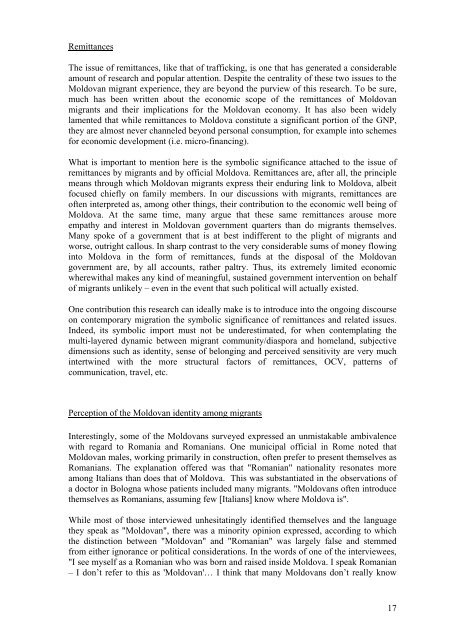Exploring the Link between Moldovan Communities Abroad ... - Iom
Exploring the Link between Moldovan Communities Abroad ... - Iom
Exploring the Link between Moldovan Communities Abroad ... - Iom
You also want an ePaper? Increase the reach of your titles
YUMPU automatically turns print PDFs into web optimized ePapers that Google loves.
RemittancesThe issue of remittances, like that of trafficking, is one that has generated a considerableamount of research and popular attention. Despite <strong>the</strong> centrality of <strong>the</strong>se two issues to <strong>the</strong><strong>Moldovan</strong> migrant experience, <strong>the</strong>y are beyond <strong>the</strong> purview of this research. To be sure,much has been written about <strong>the</strong> economic scope of <strong>the</strong> remittances of <strong>Moldovan</strong>migrants and <strong>the</strong>ir implications for <strong>the</strong> <strong>Moldovan</strong> economy. It has also been widelylamented that while remittances to Moldova constitute a significant portion of <strong>the</strong> GNP,<strong>the</strong>y are almost never channeled beyond personal consumption, for example into schemesfor economic development (i.e. micro-financing).What is important to mention here is <strong>the</strong> symbolic significance attached to <strong>the</strong> issue ofremittances by migrants and by official Moldova. Remittances are, after all, <strong>the</strong> principlemeans through which <strong>Moldovan</strong> migrants express <strong>the</strong>ir enduring link to Moldova, albeitfocused chiefly on family members. In our discussions with migrants, remittances areoften interpreted as, among o<strong>the</strong>r things, <strong>the</strong>ir contribution to <strong>the</strong> economic well being ofMoldova. At <strong>the</strong> same time, many argue that <strong>the</strong>se same remittances arouse moreempathy and interest in <strong>Moldovan</strong> government quarters than do migrants <strong>the</strong>mselves.Many spoke of a government that is at best indifferent to <strong>the</strong> plight of migrants andworse, outright callous. In sharp contrast to <strong>the</strong> very considerable sums of money flowinginto Moldova in <strong>the</strong> form of remittances, funds at <strong>the</strong> disposal of <strong>the</strong> <strong>Moldovan</strong>government are, by all accounts, ra<strong>the</strong>r paltry. Thus, its extremely limited economicwherewithal makes any kind of meaningful, sustained government intervention on behalfof migrants unlikely – even in <strong>the</strong> event that such political will actually existed.One contribution this research can ideally make is to introduce into <strong>the</strong> ongoing discourseon contemporary migration <strong>the</strong> symbolic significance of remittances and related issues.Indeed, its symbolic import must not be underestimated, for when contemplating <strong>the</strong>multi-layered dynamic <strong>between</strong> migrant community/diaspora and homeland, subjectivedimensions such as identity, sense of belonging and perceived sensitivity are very muchintertwined with <strong>the</strong> more structural factors of remittances, OCV, patterns ofcommunication, travel, etc.Perception of <strong>the</strong> <strong>Moldovan</strong> identity among migrantsInterestingly, some of <strong>the</strong> <strong>Moldovan</strong>s surveyed expressed an unmistakable ambivalencewith regard to Romania and Romanians. One municipal official in Rome noted that<strong>Moldovan</strong> males, working primarily in construction, often prefer to present <strong>the</strong>mselves asRomanians. The explanation offered was that "Romanian" nationality resonates moreamong Italians than does that of Moldova. This was substantiated in <strong>the</strong> observations ofa doctor in Bologna whose patients included many migrants. "<strong>Moldovan</strong>s often introduce<strong>the</strong>mselves as Romanians, assuming few [Italians] know where Moldova is".While most of those interviewed unhesitatingly identified <strong>the</strong>mselves and <strong>the</strong> language<strong>the</strong>y speak as "<strong>Moldovan</strong>", <strong>the</strong>re was a minority opinion expressed, according to which<strong>the</strong> distinction <strong>between</strong> "<strong>Moldovan</strong>" and "Romanian" was largely false and stemmedfrom ei<strong>the</strong>r ignorance or political considerations. In <strong>the</strong> words of one of <strong>the</strong> interviewees,"I see myself as a Romanian who was born and raised inside Moldova. I speak Romanian– I don’t refer to this as '<strong>Moldovan</strong>'… I think that many <strong>Moldovan</strong>s don’t really know17
















